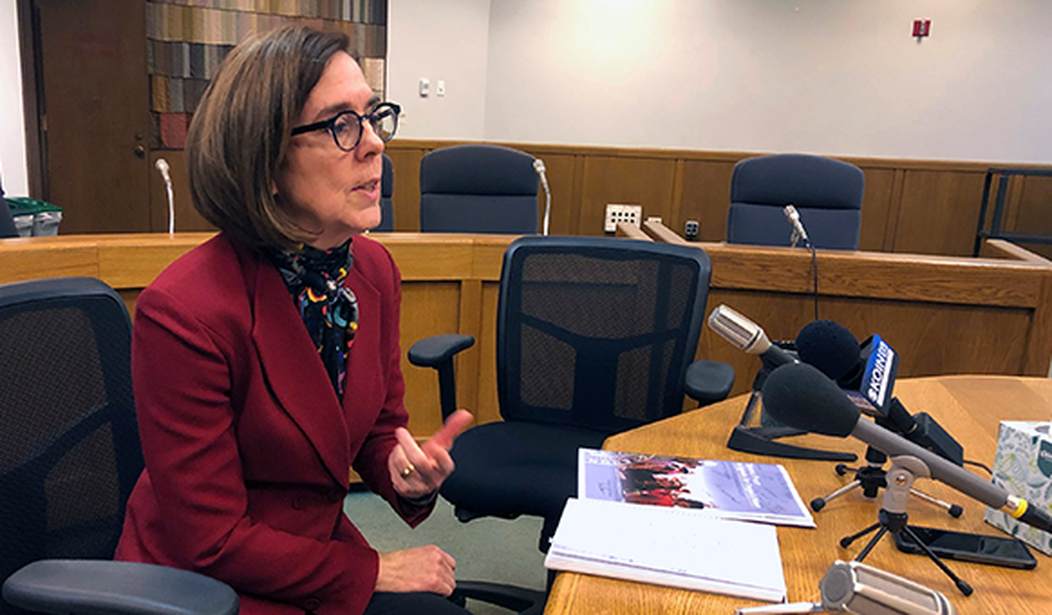There are currently 17 people awaiting execution on death row in Oregon. Or at least there were 17 people until yesterday. Governor Kate Brown is on her way out of office at the end of the year and she delivered one of her final “parting gifts” on Tuesday. She commuted the sentences of all 17 of those people. They will now all be looking at a sentence of life without the possibility of parole. The soon-to-be-ex Governor declared that “justice is not advanced by taking a life.” One has to wonder what sort of message this sends to other aspiring criminals. It’s also worth taking a look at some of the beneficiaries of the Governor’s benevolence who will now continue receiving “three hots and a cot” for the rest of their natural lives. (Oregon Live)
Gov. Kate Brown announced on Tuesday afternoon that she would commute the sentences of all 17 individuals on Oregon’s death row to life in prison without the possibility of parole, the latest in her end-of-term string of clemency decisions.
“I have long believed that justice is not advanced by taking a life, and the state should not be in the business of executing people — even if a terrible crime placed them in prison,” Brown said in a statement sent out in a press release.
“This is a value that many Oregonians share,” Brown said.
Oregon still keeps the death penalty on the books as an option for the worst, most irredeemable offenders. There’s a reason for that. The elected officials who represent the citizens of the state made it so. It’s also worth noting that this wasn’t a case where one or two death row inmates made convincing arguments that they might be innocent and the Governor wanted to err on the side of caution. She just issued a blanket commutation as a matter of principle.
No one in Oregon has been executed since 1997 and there has been a gubernatorial moratorium on executions in place since 2011. But people were still being sentenced to death when appropriate because the law remains on the books. That means that it was already unlikely that any of the 17 would actually be killed. But the possibility that the policy might be reversed was always in the background and might have given some criminals second thoughts.
But it was clear that David Bartel didn’t have any second thoughts when he stabbed a fellow inmate to death six years ago. He was already doing time for torturing and murdering a couple of his fellow gang members. Jesse Compton apparently didn’t have second thoughts either. He took his girlfriend’s three-year-old daughter into the woods, bound her, shocked her with electrical cables, raped her, and killed her. Apparently, his life was too precious to lose as well. There are plenty more on the list like them.
Oregon’s death row offers some interesting demographic figures, by the way. We frequently hear from activists that the death penalty is disproportionately applied to minorities. But as of last year, when there were 24 people on death row (before some passed away or had their sentences commuted) that was distinctly not the case. There were two Black inmates, two Native Americans, and three Hispanic convicts. The other seventeen were all white. We’ll just leave those statistics with you for a bit of food for thought.
While I’ve always been in favor of capital punishment for the most deserving, I also understand the position taken by people who are opposed to any termination of human life by the state for religious/moral reasons. I also understand the point made by those who claim that the death penalty may not always act as a deterrent. (Though it’s a permanent deterrent for at least one killer.) Many people who wind up killing someone during extraordinary conditions probably shouldn’t get the death penalty. But if you’re taking toddlers away from their mothers and electrocuting and raping them before stabbing them to death, as far as I’m concerned, your grace period has ended and we no longer require your participation in our civilization.







Join the conversation as a VIP Member